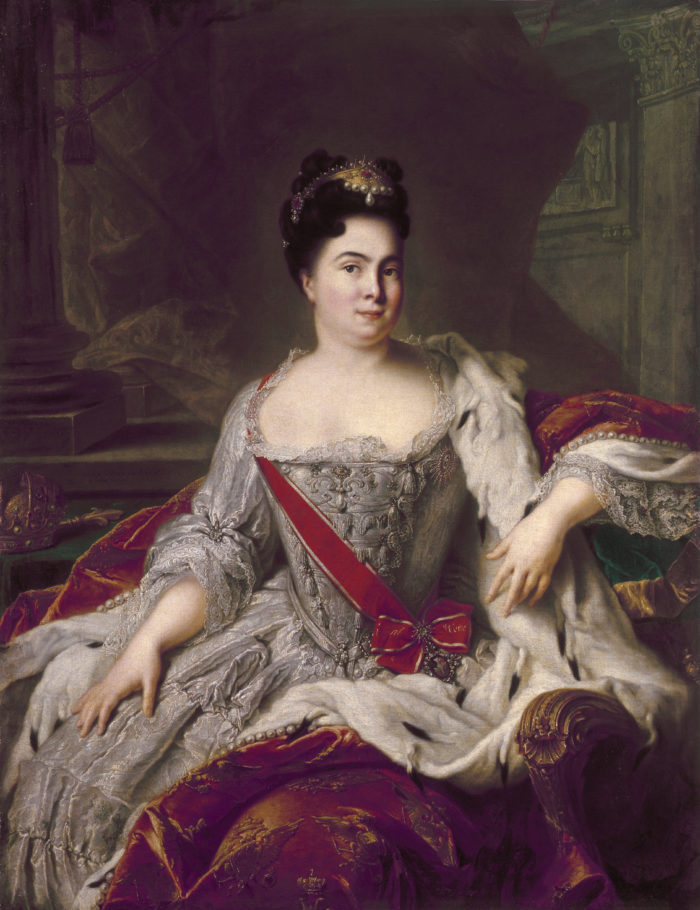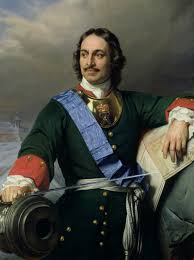by Ellen Alpsten
‘So, you are writing another novel about Catherine the Great?’
Err – no!
Before there was Catherine II, or the Great, whose life and rule has inspired dozens of adaptations, there was Catherine I of Russia—the most powerful woman history ever forgot. They shared the same name, ruling the same country, in the same century, but could hardly have been more different. While one is world-famous, the other has been unfairly relegated to a footnote in history. Unfairly, as her story is so thrilling, unlikely, and downright gutsy.

This image is in the public domain via Wikicommons.
My debut novel Tsarina tells for the first time ever of Catherine I’s astonishing rise from illiterate, illegitimate serf to empress of the world’s largest and wealthiest realm. It is also the story of the birth of modern Russia, a rising empire in turmoil and change.
I ‘discovered’ her when aged 13 in a book about the millennial history of Germans and Russians – two countries united by their political terror and tragedies, as well as their deep, soulful creation and understanding of beauty. Amazingly enough, it was impossible to find out more about her. Once I got going, research was vast: I read 17th century travel diaries, Pushkin, Gogol, Russian fairy tales and University tomes, as well as watching the dogma movie The Ark and Baryschnikov dance. When I finally dared to start writing while working as a breakfast TV anchor – a schizophrenic existence.
My heroine was born around 1684 as Marta, an illegitimate serf or unfree peasant attached to an estate, in today’s Latvia and Estonia: a life of hardship, humiliation, and labour from dawn till dusk in the shocking, strange, and sensuous world of the Russian Baroque. Whilst the Petrine era is well documented, her early life is tantalisingly blank. At some point in the early 1700s, Marta entered the household of a learned protestant priest, Ernst Glück, in the bustling Livonian market town of Marienburg as a maid. Meanwhile, Russia’s young, ambitious, and visionary Tsar Peter declared war against a then oppressive Sweden. The Great Northern War was to last two decades. Marienburg fell in Russian hands in August 1702, and Marta was taken captive. She was lucky to survive; the cruel ingenuity of her age and the rampant maltreatment of women were shocking.
In the Russian encampment – the Tsar’s army stunned by its sheer size of more than 100,000 men – Tsar Peter loved “turning the world upside down”: his best friend Alexander Menshikov was a pie baker’s son, and it was in Menshikov’s tent that the Tsar spotted Marta. She was in the right place at the right time: Peter had banished his first bigot wife into a monastery with only a hunchbacked dwarf as her companion; a wretched creature, whose tongue the Tsar had ordered to be cut out. He was captivated: nine years later, in 1711, he married her and welcomed her under the name of Catherine Alexeyevna into the Russian Orthodox Church. In 1724, Peter went even further, gifting her a crown worth a million roubles. Portraits of a later date show Marta as soft-featured, with sparkling blue eyes and rosebud lips. Yet the mute canvas hides her spirit, her sense of humour and omits her physical and psychological strength. Her life with Peter was like a river tearing her along: sink or swim. She shared his sensuous appetite and stood up to him yet accepted his straying. Peter had suffered from epilepsy since he was a young boy. As a giant of a man – he stood seven feet tall in his boots – Marta dared to hold him through his seizures when everyone else fled in terror. “She is not beautiful, but as warm as an animal,” a contemporary wrote, alluding to her sex-appeal, yet also her indomitable spirit. The Russians are a communal people – the word for happiness, “shast’ye” means to be part of a bigger entity – and she counted on family and friendship.

Nine months after their first meeting, the serf girl Marta was by the Tsar’s side when he founded the city of St. Petersburg in 1703, by building a small hut – he is said to have mastered 14 trades – on the swampy banks of the river Neva (meaning ‘bog’ in Finnish). Marta moved in with him, slowly morphing from mistress to indispensable partner. Not everyone was so lucky: Peter’s offspring from his first marriage, the Tsarevich Alexey, opposed his father’s reforms, and paid the highest possible price for contradicting his father. It is one of the goriest parts of my novel.
Tsarina is an incredibly modern novel: Russia is once more a riddle, wrapped in a mystery, inside an enigma, and she observes her adopted home-country with a foreigner’s keen eyes. At Peter’s death in February 1725, Catherine seized the crown, ruling Russia for two peaceful and prosperous years, a rarity in the nation’s history, yet was ‘bored’ without him. In true fairy tale fashion, she died surrounded by her brothers and sisters, whom she had located, freed, and ennobled. Whilst Russia was torn between forces old and new, her policy of alliances and peace contracts set into motion what was to follow politically – such as the reign of Catherine the Great, her grand-daughter in law.

Ellen Alpsten was born and raised in the Kenyan highlands. Upon graduating from L’Institut d’Etudes Politiques de Paris, she worked as a news anchor for Bloomberg TV London. Whilst working gruesome night shifts on breakfast TV, she started to write in earnest, every day, after work and a nap. Today, Ellen works as an author and as a journalist for international publications such as Vogue, Standpoint and CN Traveller. She lives in London with her husband, three sons and a moody fox red Labrador. Tsarina is her debut novel.
